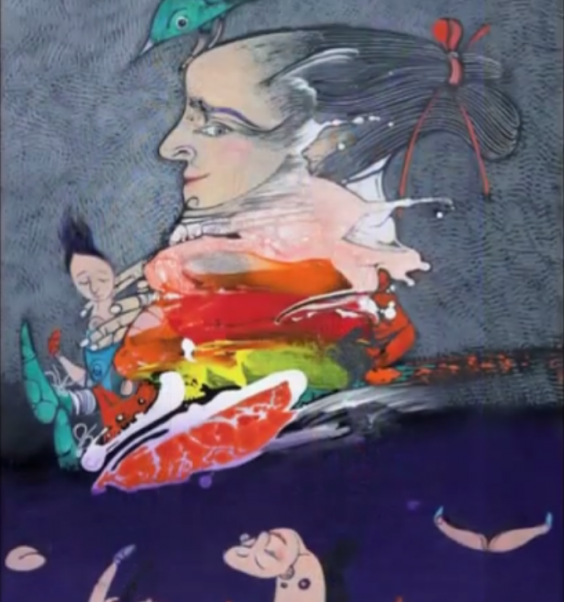The Censorship of Painting on the Isle of Freedom
by Orlando Luis Pardo Lazo / September 30, 2014 / No comments
Cuba’s censorship of a renowned national artist is a shameful show of despotism.

photo via Youtube user: inesvigo
September 10th should have been the opening of Cuban painter Pedro Pablo Oliva‘s “Utopias and Dissent” exhibition at the Museum of Art in the city of Pinar del Río. Oliva won the National Prize for Fine Arts in 2006 and received the prize for Distinction in National Culture in 1987, among other honors. The show was going to travel first from Pinar del Río to Havana, and later on to Miami. All Cuban roads lead to Miami.

- Is it worth-while to focus on the last images and letters coming from the inside of the last living utopia on Earth? Is Cuba by now a contemporary country or just another old-fashioned delusion in the middle of Nowhere-America? A Cold-War Northtalgia maybe? Can we expect a young Rewwwolution.cu within that Ancien Régime still known as The Revolution? I would like to provoke more questions than answers.

- Orlando Luis Pardo Lazo was born in Havana City and still resides and resists there, working as a free-lance writer, photographer and blogger. He is the author of Boring Home (2009) and is the editor of the independent opinion and literary e-zine Voces.
A week before the opening of the exhibition, Rubén del Valle, president of the National Council of the Visual Arts, turned up at the artist’s home and told him that they were canceling the exhibition. His reason, as Oliva recounts on his website, was that “the current context did not offer a guarantee of favorable conditions from a ‘subjective’ perspective,” Sounds like a tongue twister, but the statement is something far worse than that. The censorship of Oliva’s exhibition represents the despotism of a communist elite that has ruled Cuba with impunity for over half a century.
No one has explained to the multiple prize-winning painter what the unfavorable conditions are, from whose point of view the conditions are unfavorable, or what “guarantee” del Valle was talking about. These are the absurd, absolutist workings of Kafkaesque — or should I say Kastroesque — Cuba.
Oliva protested the censorship by publishing an open letter to del Valle on his website, declaring that if the decades of his career that he has dedicated building a better country now “seem to be worthless, and to not merit even the least respect and transparency,” then the government should order him to give back all the prizes that state organizations have awarded him.
Oliva claimed that in the eyes of State Security, he is nothing more than an artist who is capable of “taking money from the enemy.” He also revealed that government agents are coercing Oliva’s friends and colleagues into monitoring him and reporting on his private life. It’s an Orwellian horror-show for our times.
Just like every sardonic censor, Rubén del Valle made a show of his generosity: he offered Oliva the chance to exhibit his work in a Havana gallery and to hire another curator. But it has been almost 20 years since Oliva last exhibited his work in Pinar del Río, where he still lives today. He intended to use his show to celebrate the anniversary of the founding of his hometown. What’s more, Pinar del Río’s Museum of Art was happy to open the show on September 10th, as had been planned back in 2011. The local Guerrillero newspaper even published a promotional piece for the exhibition. But when Rubén del Valle turned up like a grim ghost, having traveled at top speed from Havana in his government car, the doors were permanently slammed shut for Oliva.
Del Valle later showed the full extent of his audacity in a return letter to the artist, in which he recognized that Pinar del Río is a “context” in which “parallel individuals with belligerently counterrevolutionary positions find an ideal breeding ground in which to develop their political activism.”
“What is an intellectual but a man trying always to change the world, always for the better?” Oliva asks in his open letter. He laments the fact that nobody has yet offered him a rational explanation for the cancellation.
The dream of Revolution breeds monsters. As more of a Castrologist than an astrologist, I can offer our bewildered artist an explanation: to the System, his work is unacceptable because no one in Cuba is allowed to touch the octogenarian fossil that is Fidel Castro in the late stage of his life. Castro is indeed one of the most common features of Oliva’s visual universe. To top it all off, in the paintings that make up this latest exhibit, two invented emblematic characters named Utopito and Dissident accompany the Cuban dictator.
In the doorway of his house-cum-workshop, Oliva has long displayed a poster that reads: “It is forbidden to stop dreaming.” It is shameful that the state would lay a trap like this for a noble and talented 65-year-old member of the Cuban Writers’ and Artists’ Union and the International Association of Art, as well as a consultant professor at the National Art School in Havana.
It is crucial that all the artists of the world, along with other well-meaning men and women, show Oliva their solidarity. Now. Right away. Before the Cuban government sets another legal trap for him or launches an attack on his physical integrity. If you wish to find a way to show support, you can contact Pedro Pablo Oliva’s manager and daughter, Silvia Oliva, at sosainz@gmail.com. Please, do not leave us free Cubans even more alone. Art is our way of showing that we continue to act on that verb that seems to have been forgotten on the island: to dream.




